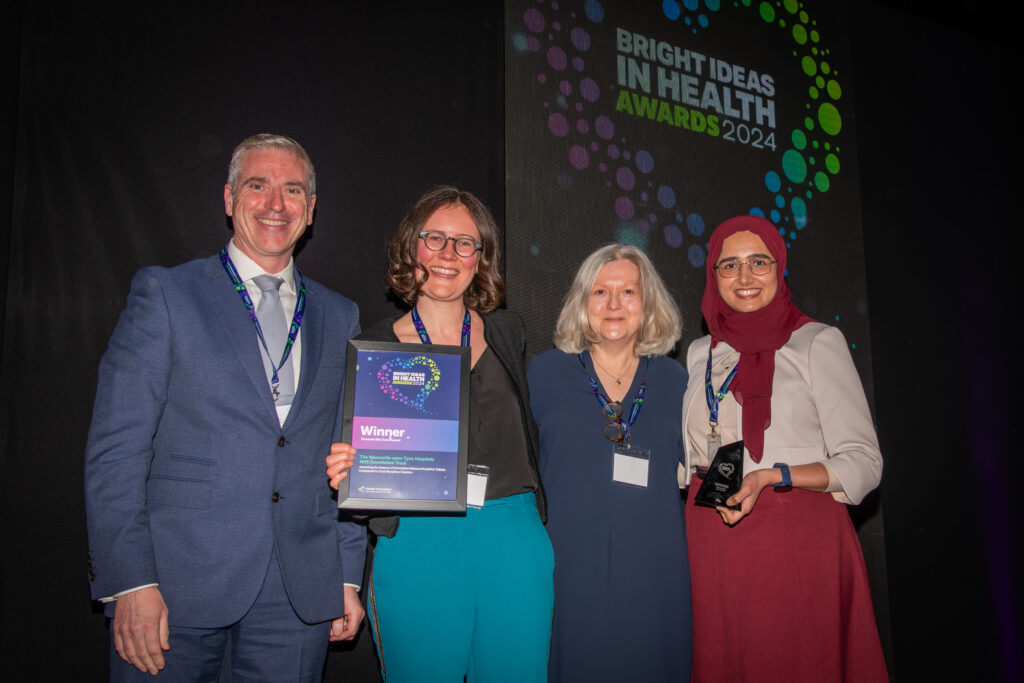Newcastle Hospitals has received an award in recognition of its efforts to reduce emissions related to medicines.
The trust picked up the towards net zero award at the Bright Ideas in Health Awards. The awards, organised by Health Innovation North East and North Cumbria (HI NENC), celebrate those who are committed to improving the health and social care system through innovation, collaboration, and research.
Reducing carbon footprint
The project was led by Fatima Tahir, a sustainability fellow at the Northern Centre for Cancer Care. Fatima’s fellowship is one of two funded thanks to the generosity of the supporters of Newcastle Hospitals Charity with the aim of supporting the reduction of the trust’s carbon footprint.
Fatima’s award-winning project looked at the benefits of switching from oral liquid morphine (Oramorph), a commonly prescribed pain relief medication used for moderate to severe pain, to an oral immediate-release tablet (Actimorph) version.
Liquid forms are typically used by clinicians, but oral alternatives are equally as effective and readily available.
Liquid morphine, while necessary for some patients e-g; those with swallowing difficulties, often involves higher emissions related to production, distribution, and disposal. The administration of liquid morphine with disposable syringes also generates significant plastic waste.
Tablets, on the other hand, provide accurate dosing compared to variable dosing for liquid solutions. Tablets are also considered safer for patients with cognitive impairment, dexterity problems, and those at risk of intentional or accidental overdose.
Halving emissions
A review led by Fatima identified that over 13,500 bottles of liquid morphine were dispensed to in-patients and as pre-packs for discharge, across the Royal Victoria Infirmary and Freeman sites in 2023-24. This did not take into account the outpatient prescriptions of liquid morphine.
Further analysis found that emissions related to these bottles was 13 tonnes of CO2, which could be halved by switching to tablets. This is equivalent to 30 trips from Land’s End to John O’Groats in an average petrol or diesel car.
The project also found that cost-savings could be made with this switch, primarily due to the reduced use of equipment, for example, syringes required to administer liquid morphine, with the best-case scenario saving over £16,000 a year.
As part of the project, a patient survey was carried out which found that 90% were willing to try tablets if it was more environmentally friendly.
Commenting on the results of the project, Fatima said:
“I am delighted to have won a Bright Ideas in Health Award for this project which highlights the potential to reduce our carbon footprint significantly in every aspect of our clinical practice. All we need is to keep looking for ways to reduce the impact of our actions on the environment.
“The project wouldn’t have been possible without support from Newcastle Hospitals Charity, which provided me the dedicated time to lead this project.
“I would also like to thank the trust’s sustainability team, my supervisors from oncology and the Centre for Sustainable Healthcare, and the team who helped with the project idea, design, and execution.”

Teri Bayliss, charity director of Newcastle Hospitals Charity said: “I’m delighted to see Fatima’s work has been recognise by the Bright Ideas in Health Awards.
“Supporting the trust’s efforts to lead on sustainability and reduce our carbon footprint is a key aim for Newcastle Hospitals Charity and we wouldn’t be able to do this without the generosity of our supporters.”
Reducing medicines waste
Fatima also carried out an audit in the ambulatory care cancer unit at the Freeman hospital to quantify the extent of environmental and financial impact of waste associated with oral chemotherapy medications.
Typically, if uncollected chemotherapy medications are returned up to five days after dispensing to the pharmacy, it can be added to existing stock and safely re-dispensed.
In current practice, chemotherapy medication is stored for 21 days in ambulatory care drug room before it is returned to the pharmacy, in case a patient returns for re-collection. This means that medication that falls outside of the five days is sent to waste disposal and incinerated in high temperatures.
In addition to environmental impact, this is also costly to the NHS, amounting to an estimated £100k per year. This can be minimised with strategies such as timely medication returns and enhanced pharmacy restocking protocols.
Dr Nicola Hutchinson, Chief Executive Officer at HI NENC, added: “The Bright Ideas in Health Awards celebrate the incredible talent and determination within our healthcare community, who work tirelessly to advance patient care and wellbeing.
“This year’s winners are a testament to the ingenuity and commitment found across our region. Congratulations to all who continue to push the boundaries of what is possible in health and care.”
- The Bright Ideas in Health Awards, now in their 19th year, honour individuals and teams that are transforming health and social care through new products, technologies, and improved service delivery.
